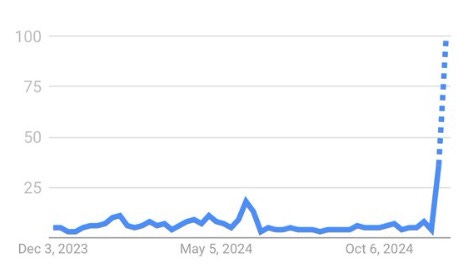Jury Nullification
A jury can in effect nullify a law that it believes is either immoral or wrongly applied to the defendant. But you may need to keep it to yourself.
Luigi Mangione has been detained in the fatal shooting of UnitedHealthcare CEO Brian Thompson. He has reportedly written a manifesto which states: “I do apologize for any strife or trauma. But it had to be done. These parasites had it coming.”
Early this year, he wrote in a review of the Unabomber manifesto: “These companies don’t care about you, or your kids, or your grandkids. … We’re animals just like everything else on this planet, except we’ve forgotten the law of the jungle and bend over for our overlords when any other animal would recognize the threat and fight to the death for their survival.”
Online searches for jury nullification have gone through the roof:
In the aftermath of the passage of the federal Fugitive Slave Act of 1850, Lysander Spooner in “An Essay on the Trial by Jury” argued that jury nullification was “a palladium of liberty” and “a barrier against the tyranny and oppression of government.”
In 2011 Tim DeChristopher wrote “I Do Not Want Mercy, I Want You To Join Me.” He was sentenced to 21 months in prison for crashing an auction of public land to save it from fossil fuel companies. He wrote: “The government claims a long prison sentence is necessary to counteract the political statements I’ve made and promote a respect for the law. The only evidence provided for my lack of respect for the law is political statements that I’ve made in public forums. Again, the government doesn’t mention my actions in regard to the drastic restrictions that were put upon my defense in this courtroom. My political disagreements with the court about the proper role of a jury in the legal system are probably well known. I’ve given several public speeches and interviews about how the jury system was established and how it has evolved to its current state. Outside of this courtroom, I’ve made my views clear that I agree with the founding fathers that juries should be the conscience of the community and a defense against legislative tyranny. I even went so far as to organize a book study group that read about the history of jury nullification. Some of the participants in that book group later began passing out leaflets to the public about jury rights, as is their right.”
These days, this seems like a good bit of wisdom on the issue:
Professor of law Doug Linder’s books include Famous Trials. In 2001, he wrote this piece:
Jury Nullification
by Doug Linder
What is jury nullification? Jury nullification occurs when a jury returns a verdict of "Not Guilty" despite its belief that the defendant is guilty of the violation charged. The jury in effect nullifies a law that it believes is either immoral or wrongly applied to the defendant whose fate they are charged with deciding.
When has jury nullification been practiced? The most famous nullification case is the 1735 trial of John Peter Zenger, charged with printing seditious libels of the Governor of the Colony of New York, William Cosby. Despite the fact that Zenger clearly printed the alleged libels (the only issue the court said the jury was free to decide, as the court deemed the truth or falsity of the statements to be irrelevant), the jury nonetheless returned a verdict of "Not Guilty."
Jury nullification appeared at other times in our history when the government has tried to enforce morally repugnant or unpopular laws. In the early 1800s, nullification was practiced in cases brought under the Alien and Sedition Act. In the mid 1800s, northern juries practiced nullification in prosecutions brought against individuals accused of harboring slaves in violation of the Fugitive Slave Laws. And in the Prohibition Era of the 1930s, many juries practiced nullification in prosecutions brought against individuals accused of violating alcohol control laws.
More recent examples of nullification might include acquittals of "mercy killers," including Dr. Jack Kevorkian, and minor drug offenders.
Do juries have the right to nullify? Juries clearly have the power to nullify; whether they also have the right to nullify is another question. Once a jury returns a verdict of "Not Guilty," that verdict cannot be questioned by any court and the "double jeopardy" clause of the Constitution prohibits a retrial on the same charge.
Early in our history, judges often informed jurors of their nullification right. For example, our first Chief Justice, John Jay, told jurors: "You have a right to take upon yourselves to judge [both the facts and law]." In 1805, one of the charges against Justice Samuel Chase in his impeachment trial was that he wrongly prevented an attorney from arguing to a jury that the law should not be followed.
Judicial acceptance of nullification began to wane, however, in the late 1800s. In 1895, in United States v Sparf, the U. S. Supreme Court voted 7 to 2 to uphold the conviction in a case in which the trial judge refused the defense attorney's request to let the jury know of their nullification power.
Courts recently have been reluctant to encourage jury nullification, and in fact have taken several steps to prevent it. In most jurisdictions, judges instruct jurors that it is their duty to apply the law as it is given to them, whether they agree with the law or not. Only in a handful of states are jurors told that they have the power to judge both the facts and the law of the case. Most judges also will prohibit attorneys from using their closing arguments to directly appeal to jurors to nullify the law.
Recently, several courts have indicated that judges also have the right, when it is brought to their attention by other jurors, to remove (prior to a verdict, of course) from juries any juror who makes clear his or her intention to vote to nullify the law.
If jurors have the power to nullify, shouldn't they be told so? That's a good question. As it stands now, jurors must learn of their power to nullify from extra-legal sources such as televised legal dramas, novels, or articles about juries that they might have come across. Some juries will understand that they do have the power to nullify, while other juries may be misled by judges into thinking that they must apply the law exactly as it is given. Many commentators have suggested that it is unfair to have a defendant's fate depend upon whether he is lucky enough to have a jury that knows it has the power to nullify.
Judges have worried that informing jurors of their power to nullify will lead to jury anarchy, with jurors following their own sympathies. They suggest that informing of the power to nullify will increase the number of hung juries. Some judges also have pointed out that jury nullification has had both positive and negative applications--the negative applications including some notorious cases in which all-white southern juries in the 1950s and 1960s refused to convict white supremacists for killing blacks or civil rights workers despite overwhelming evidence of their guilt. Finally, some judges have argued that informing jurors of their power to nullify places too much weight on their shoulders--that is easier on jurors to simply decide facts, not the complex issues that may be presented in decisions about the morality or appropriateness of laws.
On the other hand, jury nullification provides an important mechanism for feedback. Jurors sometimes use nullification to send messages to prosecutors about misplaced enforcement priorities or what they see as harassing or abusive prosecutions. Jury nullification prevents our criminal justice system from becoming too rigid--it provides some play in the joints for justice, if jurors use their power wisely.
Also see this backgrounder by Kirsten Tynan, executive director of the Fully Informed Jury Association:






Very, very interesting. Thank you Sam.